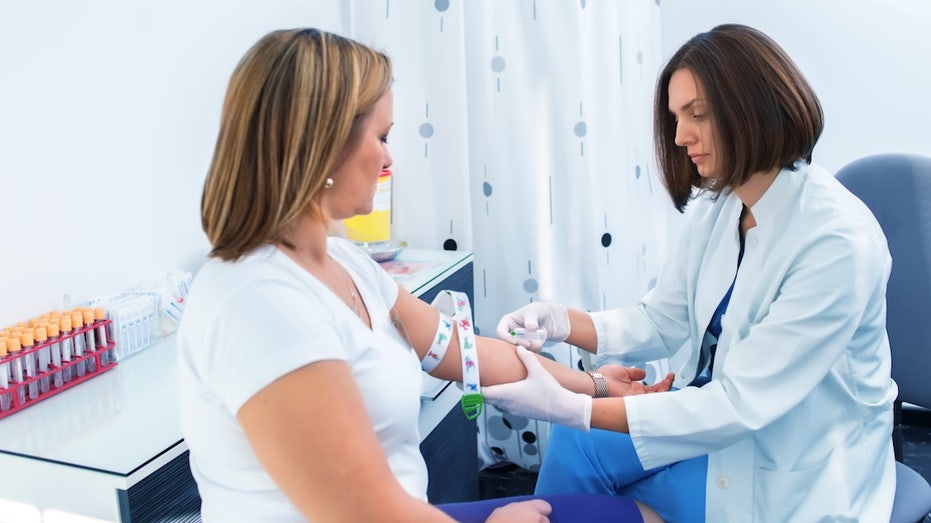A new blood test could identify common cancer types.
A new blood test was found to detect colon cancer with more than 80% accuracy â and to rule it out for 90% of healthy people. Doctors speak about how this could improve screening rates and outcomes.

It was discovered that a new blood test may identify colon cancer with over 80% accuracy and rule it out in 90% of healthy individuals.
Late last month, in San Francisco, the findings were presented at the 2025 American Society of Clinical Oncology Gastrointestinal Cancers Symposium.
The Journal of Clinical Oncology also published them.
In the study, more than 27,000 adults between 45 and 85 had their blood drawn before undergoing a colonoscopy to screen for signs of cancer. The participants were enrolled between May 2020 and April 2022.
After looking for "molecular signals of advanced colorectal cellular changes" in the blood samples, the researchers compared the results with the findings from the colonoscopy.
The researchers discovered that the test had an 81.1% sensitivity, or success rate, in identifying colon cancer that was already present.
The test's specificity, or the proportion of participants who tested negative for colon cancer but did not have it, was 90.4%.
"Additional colorectal cancer screening tests that are convenient, safe and easy to complete are needed," said lead study author Aasma Shaukat, MD, from NYU Grossman School of Medicine, in a press release from the American Society of Clinical Oncology (ASCO).
"Until now, we have only had stool-based tests and colonoscopy or sigmoidoscopy (stool-based). A blood test has the potential for improving colorectal cancer screening rates."
Pamela Kunz, MD, from Yale School of Medicine, noted that the experimental blood test represents a "new tool in our toolbox" of colorectal cancer screening options.
"The study evaluated blood-based screening for colorectal cancer and may provide a convenient and effective option for colorectal cancer screening in the average-risk U.S. population," Kunz, who was not involved in the study, stated in the same press release.
Pashtoon Kasi, MD, medical director of gastrointestinal medical oncology at City of Hope Orange County in California, was not involved in the study but noted that these types of blood tests — also known as "liquid biopsies" — are "revolutionizing cancer care."
"It is a simple blood test looking at different components of cancers or tumors that are being shed in the bloodstream — hence, the term ‘liquid biopsy,’" Kasi told Fox News Digital.
Several different kinds of these blood tests are already making their way into clinical practice, the doctor noted.
"Some are cancer-specific like this one, which will be geared toward early detection of colon and rectal cancer. Other liquid biopsy tests are what they call multi-cancer early detection tests (MCED) — meaning they can pick up multiple cancers in just one blood draw," he said.
The doctor noted that blood tests shouldn’t be used in place of colonoscopies, which remain the "gold standard" of colon cancer screening.
"Colonoscopies can prevent colon cancer through the detection and removal of polyps, non-cancerous growths in the lining of the bowel that can become cancerous," Kasi said.
"Blood tests are designed to detect cancer, not prevent it."
If cancer is detected during a blood test, additional tests like a colonoscopy will still need to be done, he added.
"Like most cancers, early detection of colon cancer typically results in better outcomes," said Kasi. "Typically, colon cancer is slow-growing — and in its early stages, it can be asymptomatic."
At least a third to half of people do not get colon cancer screenings, studies show — and the hope is that the blood test can help "fill the void," according to Kasi.
"We know that a colonoscopy typically conjures up unpleasant thoughts of bowel prep, a liquid diet and embarrassment, so it is not a surprise that blood screening tests offer greater appeal," he said, calling the blood-based test a "potential game-changer" in improving screening rates.
Expanded screening options are especially important given the trend of more people getting diagnosed with colon cancer under the age of 50.
"Colorectal cancer is on a particularly steep incline – so steep that by the year 2030, it will be the leading cause of cancer death for young adults in the United States," Kasi warned.
"It will be imperative to expand research in this area and to have diagnostic testing that is available for a younger demographic."
Colorectal cancer is the fourth most common cancer in the U.S. and the second-deadliest type, according to the Colorectal Cancer Alliance.
Looking ahead, researchers will continue to study the long-term impact of the colorectal blood test, they noted.
"As blood-based tests get approval from regulatory bodies and Medicare and other payors, the tests will become available for clinical use," lead study author Shaukat told.
According to the doctor, men and women aged 45 to 85 who are at average risk for colon cancer and in need of screening might choose blood-based testing.
"If you have high risk family history or other medical condition that puts you at increased risk for colon cancer, the test is not an option," he stated. "Also, if the test is positive, it requires a colonoscopy to evaluate for colon polyps or colon cancer."





















